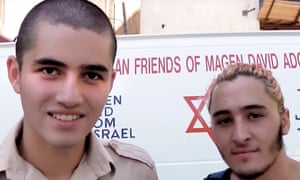Comment, I was a child in the 60s and the 70s and i heard the news everyday because my parents listened to the radio before going to work in the morning and every day we heard the news about the war in Vietnam and the war between Israel and the Palestinians who fought to get back their land and territory .... today the people of Vietnam are doing other things thanks to peace having settled there .... will i live to see the peace settleing in between the Palestinians and their winning israeli "Surveilance kings"?
What Israelis and Palestinians think – uncut interviews from the streets
Corey Gil-Shuster puts his followers’ questions to the public, no matter how controversial
In 2012, the Israeli-Canadian graduate Corey Gil-Shuster was growing weary of seeing arguments on the internet about the conflict between Israelis and Palestinians.
So he took a camera to the streets of Tel Aviv and began filming conversations with citizens and posting them on YouTube.
Gil-Shuster wanted to improve dialogue between the two sides, as well as educate outsiders about the realities of the conflict. “Part of the problem is Israelis and Palestinians are very cut off from each other,” he told the Guardian.
Instead of coming up with interview questions, Gil-Shuster decided to solicit them from internet users around the world. Thus the Ask an Israeli/Ask a Palestinian Project was born.
His first video asked people in Tel Aviv what they thought of the idea of aone-state solution to the conflict. In the six years since, he has interviewed thousands of Israelis and Palestinians across hundreds of videos and has racked up 44m views on his channel.
Use of the vox pop – from the Latin term vox populi meaning voice of the people – is a common journalistic tool to provide a snapshot of public opinion, but is rarely used on such a large scale; Gil-Shuster produces new videos every week.
Quick guide
What is the Upside?
Gil-Shuster, who self-funds the project, says he has strict rules to ensure it remains as representative of public opinion as possible. Admitting it is not an exact science, he says he tries to randomly select “the most average” people he can find on the street, ensuring a mix of different genders, ages and backgrounds.
Soon after starting the project, Gil-Shuster went to the West Bank to seek the views of Palestinians, working with a Palestinian translator.
The channel, which has more than 100,000 subscribers, has largely found popularity in Europe and the US. But Gil-Shuster says he often receives feedback from Palestine and other parts of the Arab world – some negative, some positive – with his videos getting a lot of hits in Saudi Arabia.
Gil-Shuster, who works by day as an administrator at Tel Aviv University, does not shy away from asking the controversial or offensive questions requested by his viewers. If there is a common perception about an aspect of the conflict, he thinks there is value in putting it to people on street. “As a person involved in this conflict, I’m trying to figure out where perception meets reality,” he said.
Once he has picked an interviewee, Gil-Shuster says all their answers are included in the video. “People say horrible things that I think make Israelis and Palestinians look horrible. It has to be included.”
“I never cut or edit anyone,” he says. This pre-empts viewer criticism that he has chopped the videos to make a political point. He is variously accused of pro-Israeli and pro-Palestinian bias, depending on the video. But Gil-Shuster says he sees the project partly as a mirror for Israelis and Palestinians to hold up to themselves.
He says the videos are a great way for foreigners to learn about the conflict. “If you want to understand a conflict, you need to know what it’s about,” he said. “You need to know all those small issues that are happening. Living in myth drives people to the wrong solutions.”
This article is part of a series on possible solutions to some of the world’s most stubborn problems. What else should we cover? Email us at theupside@theguardian.com


Comments
Post a Comment